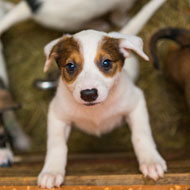Pet Advertising Advisory Group launched in Belgium

“We know that many people in Belgium choose to purchase their pet online and we have become increasingly concerned that they are unwittingly purchasing poorly bred animals."
A group of individuals and organisations across Belgium have come together to form a new association (BelgPAAG), with the purpose of improving the welfare of pets for sale. The Pet Advertising Advisory Group (PAAG), led by British animal charity Blue Cross, is aiming to raise awareness about the welfare issues associated with buying pets online.
Recent research, conducted by the Blue Cross, revealed that on a single day in January 2017 there were more than 2,000 adverts for pets, live across four major websites in Belgium. BelgPAAG is strongly advising those looking to buy pets online, to undertake as much research as possible, prior to purchase, in order not to fall victim to sellers who disregard animal welfare.
The initiative will see the Blue Cross working in collaboration with its EU counterparts, as part of the EU Dog and Cat Alliance. BelgPAAG is the third pet advisory group to be formed in Europe, with the alliance planning to launch more groups across Europe in the future. Alongside PAAG UK and IPAAG, BelgPAAG will work to challenge the major issue of poor welfare standards of animals sold online.
Marleen Elsen, chair of BelgPAAG and the National Organisation for Animal Protection, said: “We know that many people in Belgium choose to purchase their pet online and we have become increasingly concerned that they are unwittingly purchasing poorly bred animals.
“We believe there is more leading websites in Belgium can do to address these problems and make the internet a safer environment for both pets and pet owners. This inaugural meeting will bring together key charities to discuss the current situation and how we begin to work with websites to tackle this issue.”
Becky Thwaites, head of public affairs at the Blue Cross, said: “Blue Cross is delighted to see the launch of BelgPAAG, we hope that this is the first of many European Pet Advertising Advisory Groups. We know that online sales of pets are a growing problem and have seen the success PAAG in the UK has had in removing inappropriate ads and improving the standard of advertising and most importantly, improving the welfare of the animals.
“We look forward to working with our Belgian colleagues to ensure that BelgPAAG is able to protect consumers and improve the welfare of animals being bred and sold in Belgium.”



 The veterinary mental health charity Vetlife is inviting the veterinary community to join it for a sponsored cold-water dip.
The veterinary mental health charity Vetlife is inviting the veterinary community to join it for a sponsored cold-water dip.